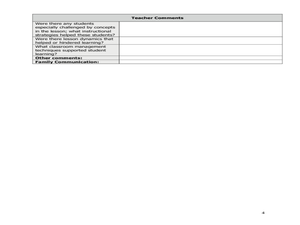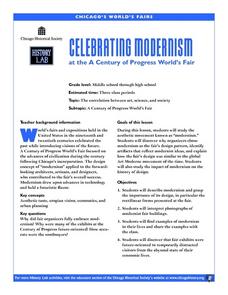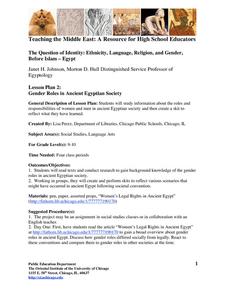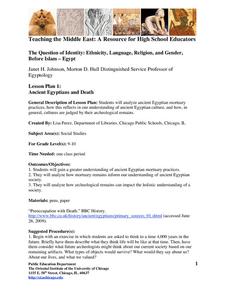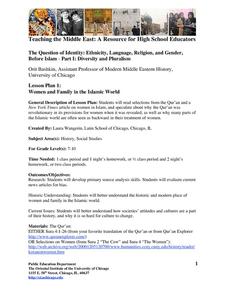Curated OER
Mystery Photo!
Pupils examine a photo of the compass plant, and research how the pioneers used the plant as a way of orienting themselves while travelling through the prairies. They analyze the photograph, and complete a Photo Analysis Guide Worksheet.
Curated OER
Women in Jazz
Students watch a video: "VH1 Millennium Jazz Festival From The White House" to become familiar with prominent women in jazz. They discuss the vocally oriented nature of jazz and the contributions made by women on and off stage.
Curated OER
What If Things Were Different
Students understand how history is made, in terms of the individuals responsible for actions in the past and in terms of those in the present who preserve and interpret stories from the past.The subject matter relates to gender and...
Curated OER
Taking the Human Rights Temperature of Your School
Students evaluate their school's human rights climate. They administer a survey, participate in discussion groups and consider the human rights enjoyed by various groups including subgroups of gender, race and sexual orientation.
Curated OER
Hammurabi's Code: What Does It Tell Us About Old Babylonia?
Students examine life in Babylonia during the time of King Hammurabi. They read and discuss excerpts of the Code of Hammurabi, participate in a simulation of advisors to the king, complete an online interactive activity, answer...
Curated OER
Symmetry in Relief
Learners explore radial symmetry. In this 3 dimensional art and geometry activity, students identify examples of radial symmetry in everyday objects. Learners create an imprint using radial symmetry on clay tiles.
Curated OER
Streetfilms' Moving Beyond the Automobile
This is an exceptional series that you can use in an environmental or engineering unit. There are four lessons: "Sustainable Transportation," "Designing for Safety," "Changing the Landscape," and "Engaging in Policy." Each lesson plan...
Roy Rosenzweig Center for History and New Media
European Explorers
To compare how the Spanish, French, and English approached the exploration of North America, class groups examine primary source documents and become experts on one of four explorers: Francisco Coronado, Robert LaSalle, Samuel de...
University of Chicago
Using Artifacts for Clues About Identity
Learn about the ancient Near East through a close examination of ancient artifacts. Lead your class into analysis by first observing an artifact as a class. Pupils can then work in pairs to analyze the other artifacts and compile a list...
University of Chicago
Comparing Modern and Ancient Ideas of Ethnicity and Identity
Explore ethnicity and identity with a research and writing assignment. Class members conduct online research, looking in particular at images and carefully noting down their sources on notecards. They read about identity and compose...
Curated OER
Celebrating Modernism at the A Century of Progress World's Fair
Students examine aesthetic movement known as modernism, discover why organizers chose modernism as World Fair's design pattern, interpret photographs of modernist fair buildings and identify artifacts that reflect modernist ideas, and...
University of Chicago
Gender Roles in Ancient Egyptian Society
After reading about the legal status of women in the Old Kingdom of ancient Egypt and doing some additional research, your young historians will work in groups to develop short skits that reflect a typical gender-role related scenario...
Curated OER
Presenting Ethical Dilemmas in the Classroom
Students explore the dilemma of bioethics. Students review a cast study on a bioethical topic. They research the facts, values, and stakemakers in the controversial debate. Students consider the consequences and discuss their findings...
University of Chicago
Exercise in Conflict Resolution
How do major religions, including Judaism, Christianity, and Islam, differ in how they view the role of individual freedoms within society, the definition of morality, and the importance of politically satisfying the greater good? Here...
University of Chicago
What IS the Difference Between Sunni and Shi'ite Muslims?
The distinction between Shiite and Sunni Muslims is an often misunderstood concept, yet very important for its implications in global affairs and for a more comprehensive understanding of the religion of Islam.
Facing History and Ourselves
Identity and Place
Build scholars' ability to understand their own values and learn about World War II at the same time. Scholars write poetry and discuss identity and place in depth with an in-depth social studies resource.
Society for Science & the Public
Easter Islanders Made Tools, Not War
When studying artifacts, especially tools, how do archaeologists determine what the devices were used for? In what ways might researchers' previous experiences influence their perception of an artifact? An article about researchers'...
University of Chicago
Ancient Egyptians and Death
What archaeological evidence remains of ancient Egyptian burial and mortuary practices, and what can this information tell us about ancient Egyptian society?
University of Chicago
Women and Family in the Islamic World
How does the Qur'an detail the role of women? What modern social issues are linked to Islamic law? Address these questions with your young historians through close analysis of primary and secondary source documents.
University of Chicago
Addressing Stereotypes
How is a stereotype defined, and what are some mechanisms we can use to combat negative stereotyping? Your young historians will discuss how and why stereotyping occurs, as well as consider the roots of modern conceptions of the Middle...
Curated OER
Mapping Perceptions of China
Students discuss what types of things are included on a map. They compare and contrast maps of China with a map they create and practice using different types of maps. They write analysis of their classmates maps.
Curated OER
The Paths of Literature: The Family Today
Use the internet to research the differences between families in the past and today. In groups, they identify the reponsibilities and roles of each member of the family. As a class, they compare and contrast non-fiction and fiction and...
Curated OER
Social Studies: Don't Ask, Don't Tell
Learners review the U.S. military's policy concerning gay and lesbian soldiers. They research the "don't ask, don't tell, don't pursue" approach and determine its meaning. Students interview military personnel and present their findings...
Curated OER
Why Vote? A Public Awareness Campaign
Students examine the structure of local government and determine why citizens vote. For this civics lesson, students listen to a lecture about the structure of local government and then encourage others to exercise their right to vote.
Other popular searches
- Compass Orienteering
- Orienteering Lesson Plans
- Orienteering and Maps
- Orienteering Compass Pacing
- Orienteering Maps
- Compass and Orienteering
- Sky Orienteering
- Orienteering Unit Plan
- Orienteering Scavenger Hunt
- Orienteering Compas
- Orienteering 6th Grade
- Pacing Orienteering







